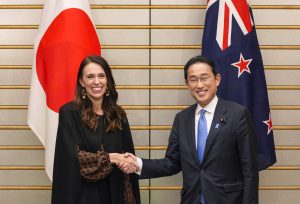On April 11, New Zealand Prime Minister Jacinda Ardern announced that she would be visiting Singapore and Japan. After stopping over in Singapore, she stated that she would meet with Japanese Prime Minister Kishida Fumio to talk about trade and reconnect with New Zealand’s “closest Indo-Pacific economic and security” partner, Japan. Her trip was important for New Zealand because it was her first overseas trip to talk about trade deals with the country’s fourth largest economic partner since the nationwide border closure in March 2020.
However, more significantly, Ardern did not visit Japan only to talk trade; it was a strategic move to reconnect with one of New Zealand’s closest friends to deal with security issues in the Indo-Pacific region. Indeed, Ardern’s trip was a major turning point in the New Zealand-Japan bilateral strategic and security relationship.
Following the summit meeting on April 21, Ardern and Kishida released a joint statement. Compared to the previous joint statement in 2019, the core message was clear in the statement’s title: “Japan and Aotearoa New Zealand: a Strategic Cooperative Partnership for Common Peace, Security and Prosperity.” Discussions on what the two countries would do are over; they now stand shoulder-to-shoulder and are ready to take substantive actions in achieving, as the title stated, “Common Peace, Security and Prosperity” in the Indo-Pacific region.
Ardern and Kishida shared the view that common peace, security, and prosperity in the region have been threatened by the Russian aggression against Ukraine and Chinese human rights violation in Xinjiang. Moreover, both agreed that to realize stability in the region, they need to tackle “growing strategic challenges in the Pacific that could destabilize the regional security environment,” inevitably referring to the increasing presence of China in the Pacific.
Beyond the message in the title of the joint statement, its content also shows a significant sign of New Zealand and Japan stepping up their bilateral strategic partnership both in quantity and quality. The 2022 joint statement almost doubled the number of paragraphs, from 15 to 26. Both leaders now comfortably use the term “Indo-Pacific” in their political statements. This indicates that New Zealand has accepted Japan’s “free and open Indo-Pacific” vision to a greater extent when it comes to defining its role with close friends in the region. Ardern and Kishida are no longer hesitant but openly said that their countries “are key partners in advancing and protecting peace and security in the Indo-Pacific” who have a “shared commitment to realize a free and open Indo-Pacific based on the rule of law.”
Also, taking an opportunity to celebrate the 70th anniversary of the commencement of their diplomatic relationship, Ardern and Kishida agreed to sign an information-sharing agreement in the near future, an agreement that Japan has with its close security partners, such as the U.S., the U.K., Australia, and India. Coincidently, these countries are also members of the Quad, AUKUS, the Five Eyes, and/or ANZUS. Their information sharing agreement could supplement emerging as well as traditional minilateral security networks. The so-called Quad Plus may be something both leaders are considering.
Further, there are three unprecedented actions the two agreed to or have already taken for regional peace and stability under the Japan-New Zealand strategic partnership. First, Ardern and Kishida promised to hold their first foreign-defense ministerial (2+2) meeting. Second, recognizing the importance of closer cooperation between New Zealand’s Defense Force and Japan’s Self-Defense Forces, both leaders agreed to hold a bilateral military exercise. Third, to strengthen defense diplomacy, the Japanese government, for the first time, sent a defense attaché to the Embassy of Japan in Wellington in April 2022.
These are positive developments in many respects. Both countries share fundamental values of a rules-based, not power-based, regional and international order in their foreign and security policies. These values have become more important than ever before, given recent situations in the South China Sea and now in Ukraine.
New Zealand and Australia are currently facing challenges stemming from the gradual expansion of China’s influence over the South Pacific region. The China-Solomon Islands security pact, followed by a strong backlash from many South Pacific countries as well as New Zealand, Australia, and Japan, signifies the emerging strategic competition among major powers in the region.
In part, the Kishida administration is preparing for the upgrade of Japan’s National Security Strategy of 2013 and National Defense Program Guidelines of 2018 in order to address these deteriorating issues. It has also been reported that Kishida is working on increasing Japan’s defense budget to 2 percent of GDP. Given the current situations in the Indo-Pacific region and beyond, such changes are necessary.
At the same time, however, it is equally vital for New Zealand and Japan to be empathetic listeners to Pacific countries and genuine doers in dealing with their real problems. While their emphasis on “the existential threat that climate change poses to the world, including many partners in the Pacific” in the 2022 joint statement is welcome, New Zealand and Japan need to cooperate with other like-minded powers and walk the talk in ensuring environmental security of the Pacific as well.
































